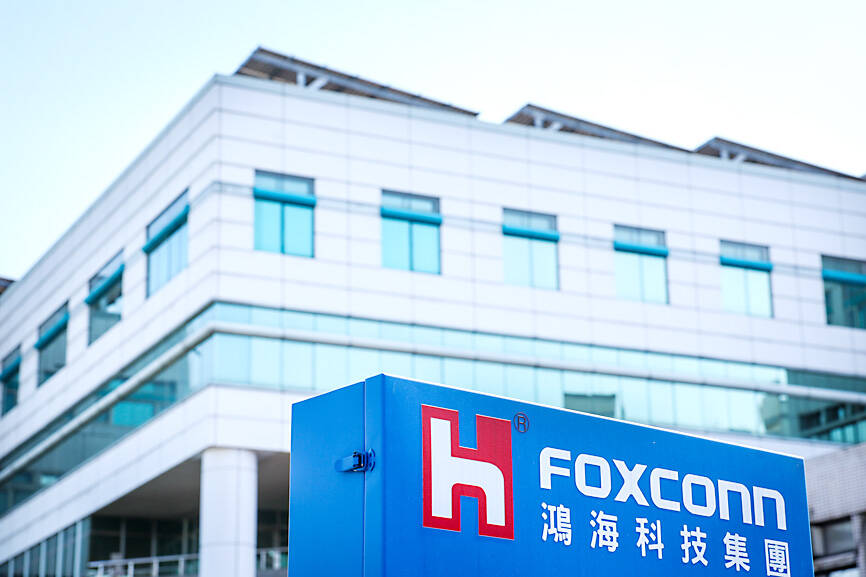Hon Hai Precision Industry Co (鴻海精密), the world’s biggest electronics manufacturer, yesterday said it is expanding production capacity of artificial intelligence (AI) servers based on Nvidia Corp’s Blackwell chips in Taiwan, the US and Mexico to cope with rising demand.
Hon Hai’s new AI-enabled factories are to use Nvidia’s Omnivores platform to create 3D digital twins to plan and simulate automated production lines at a factory in Hsinchu, the company said in a statement.
Nvidia’s Omnivores platform is for developing industrial AI simulation applications and helps bring facilities online faster.

Photo: CNA
Hon Hai’s Mexican facility is to begin production early next year and the Taiwan site is to enter production next month, Nvidia wrote on its blog.
The Mexican facility could deliver significant cost savings and achieve a reduction in kilowatt-hour usage of more than 30 percent annually, it said.
Hon Hai, which ships 40 percent of global servers, said it is the world’s first manufacturer of the Blackwell devices.
The firm said it expects production volume to rise next quarter.
In a separate statement, Hon Hai said it has won best-applicant status in a land development project in Kaohsiung, having invested NT$15.9 billion (US$490.44 million) in conjunction with the Kaohsiung Mass Rapid Transit Bureau.
The investment set a record for joint land development projects with the Kaohsiung City Government.
Hon Hai plans to build a 45-floor office building and a 32-floor residential-commercial complex at the site, which is to house its new southern Taiwan flagship headquarters, the company said, adding that demand for talent is growing along with its expansion in Kaohsiung.
The project is part of Hon Hai’s broader investment plans in the city, it said.
The company last year said it planned to invest NT$25 billion in the city in the following three years, including a software research and development center, an electric bus manufacturing facility, a large advanced AI computing center and a battery manufacturing center.

On Tuesday, US President Donald Trump weighed in on a pressing national issue: The rebranding of a restaurant chain. Last week, Cracker Barrel, a Tennessee company whose nationwide locations lean heavily on a cozy, old-timey aesthetic — “rocking chairs on the porch, a warm fire in the hearth, peg games on the table” — announced it was updating its logo. Uncle Herschel, the man who once appeared next to the letters with a barrel, was gone. It sparked ire on the right, with Donald Trump Jr leading a charge against the rebranding: “WTF is wrong with Cracker Barrel?!” Later, Trump Sr weighed

HEADWINDS: Upfront investment is unavoidable in the merger, but cost savings would materialize over time, TS Financial Holding Co president Welch Lin said TS Financial Holding Co (台新新光金控) said it would take about two years before the benefits of its merger with Shin Kong Financial Holding Co (新光金控) become evident, as the group prioritizes the consolidation of its major subsidiaries. “The group’s priority is to complete the consolidation of different subsidiaries,” Welch Lin (林維俊), president of the nation’s fourth-largest financial conglomerate by assets, told reporters during its first earnings briefing since the merger took effect on July 24. The asset management units are scheduled to merge in November, followed by life insurance in January next year and securities operations in April, Lin said. Banking integration,

LOOPHOLES: The move is to end a break that was aiding foreign producers without any similar benefit for US manufacturers, the US Department of Commerce said US President Donald Trump’s administration would make it harder for Samsung Electronics Co and SK Hynix Inc to ship critical equipment to their chipmaking operations in China, dealing a potential blow to the companies’ production in the world’s largest semiconductor market. The US Department of Commerce in a notice published on Friday said that it was revoking waivers for Samsung and SK Hynix to use US technologies in their Chinese operations. The companies had been operating in China under regulations that allow them to import chipmaking equipment without applying for a new license each time. The move would revise what is known

Artificial intelligence (AI) chip designer Cambricon Technologies Corp (寒武紀科技) plunged almost 9 percent after warning investors about a doubling in its share price over just a month, a record gain that helped fuel a US$1 trillion Chinese market rally. Cambricon triggered the selloff with a Thursday filing in which it dispelled talk about nonexistent products in the pipeline, reminded investors it labors under US sanctions, and stressed the difficulties of ascending the technology ladder. The Shanghai-listed company’s stock dived by the most since April in early yesterday trading, while the market stood largely unchanged. The litany of warnings underscores growing scrutiny of